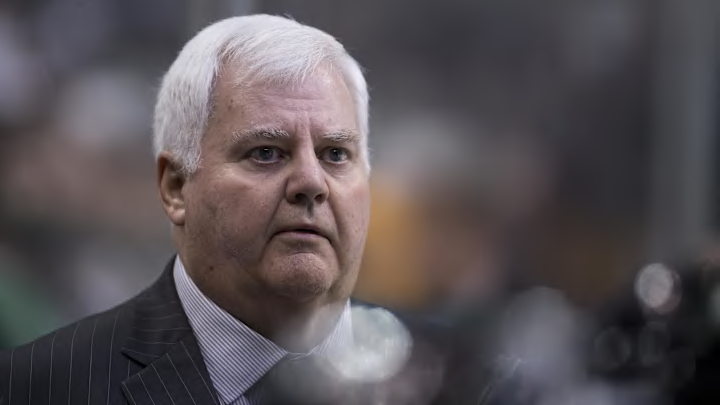In this Coaching Benchmarks series, we will take a look back at what happened to the former coaches of the Flyers after they stepped out from behind the bench in Philadelphia. The Kudos Group highlights coaches who drew the short straw in Philly but had positive results after moving on to different teams.
Bill Barber (2000-02)
Barber played his entire NHL career in Philadelphia and was part of two Stanley Cup-winning teams. Knee issues forced the former captain into retirement in 1984. He went on to various AHL coaching stints and was inducted into the Hockey Hall of Fame in 1990. 1998, he led the Philadelphia Phantoms to their first Calder Cup championship from behind the bench. Future Flyers coach John Stevens captained the team on the ice.
He then had two strong seasons as head coach of the Flyers, but the brewing player unrest led to his ousting just one year after he won the Jack Adams Award. For the following six years, he was the director of player personnel for the Tampa Bay Lightning, getting his name etched onto the Stanley Cup again in 2004.
In 2008, he returned to the Flyers as a scouting consultant, a position he holds to this day.
Bill Barber was set up for success in Philadelphia, where he won two Stanley Cups as a player. He was elected to the Hall of Fame, coached the Philadelphia Phantoms to their first Calder Cup championship, and looked good in his two seasons behind Philly’s bench. Agitated players forcibly pushed him out of Philly. He went to Tampa Bay and got his name on the cup again in 2004, after his Bolts knocked the Flyers out in the Conference finals.
Bob McCammon (1978-79, 1982-84)
McCammon’s tenure in Philadelphia was a strange one. After succeeding Fred Shero, he and his assistant coach, Terry Crisp, were fired in 1979 due to “lack of discipline and confusion,” according to the Press-Republican. In 1982, he was rehired to coach the Flyers with eight games remaining in the season. The team finished in the top three in their division and made the playoffs in each season under his leadership.
McCammon served as an assistant coach for the Edmonton Oilers during the 1985-86 season and as head of player development in 1986-87. The Oilers won the Cup that year, but his name was not engraved.
He was behind Vancouver’s bench from 1987-91 and was a finalist for the Jack Adams Award in the 1989-90 season. He added to his jewelry collection twice more as a scout for the Detroit Red Wings during their Stanley Cup victories in 2002 and 2008.
McCammon’s “lack of discipline” apparently did not follow him around the rest of the league. He was a part of three Stanley Cup-winning teams after leaving Philadelphia.
Ken Hitchcock (2002-06)
Hitchcock coached three-straight 100+ point Flyers teams that finished either second or first in the Atlantic. In those three seasons, the team lost in the Conference Semifinals, Conference Finals (losing to the Tampa Bay Lightning, coached by John Tortorella), and Conference Quarterfinals.
After a 1-6-1 start to the 2006-07 season, he was dismissed and quickly landed behind the bench in Columbus, where he had minimal success. The 2008-09 team went to the Conference Quarterfinals, but were swept.
From 2011-17, he coached the St. Louis Blues to five straight playoff appearances. He would be replaced by eventual Flyers’ interim coach, Mike Yeo, who was then replaced by former Flyers’ coach, Craig Berube, who immediately won the Stanley Cup with the Blues.
Hitchcock returned to Dallas for a season and then retired in April 2018. Seven months later, he came out of retirement to coach Edmonton before being dismissed in 2019.
Ken Hitchcock was kind of the Andy Reid of the NHL, except without all the championships. His teams always seemed to perform well and be perennial contenders. His lone Stanley Cup championship came with the Dallas Stars in 1998-99, after leaving Philly as an assistant in 1993 but before returning as the head coach in 2002-03.
